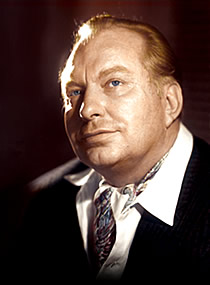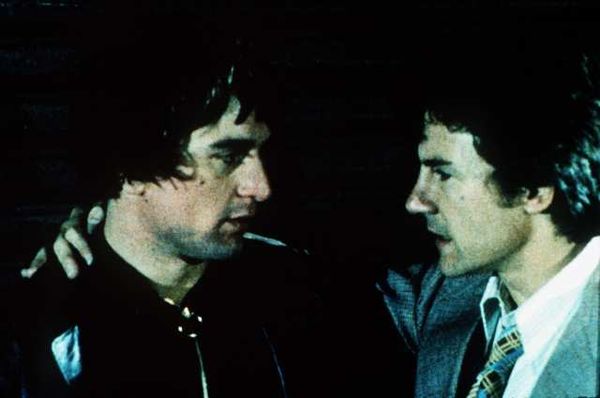Short Fuse Commentary: Contra “The Master”
The director of THE MASTER, Paul Thomas Anderson, runs toward Scientology as fast as he runs away from it and its top guns (Tom Cruise did visit the set to lodge a few complaints).
By Harvey Blume.
Some summers ago, on a warm night in Harvard Sq., I wandered past a space that had been empty since Wordsworth Books shut down several years before. To my surprise, that storefront was well-lit and active again — in fact, hyperactive: there was a greeter, or barker, posted outside. It being Harvard Sq., not Coney Island, this was not the norm. I went in.
This space that had once nattily showcased thousands of books — classics of fiction, science, philosophy and history; glossy new titles packed so steamily together it seemed sexual congress among them was quietly underway; an airy children’s book section — this venue so good for ogling books and people was now every inch taken up with wall panels, posters, and texts announcing atrocities and mass murders that had somehow slipped my notice.
The NY Times is lobbed to my doorstep daily, and I spend more time than perhaps I should combing through online sites and sources. I am not entirely ignorant about current events or recent history. Still, this genocide blindsided me. Who was behind it? None of the usual suspects, it seemed — not Hitler, Stalin, Pol Pot, Mao. The photographs of wretched, starving human beings, some gasping out their last on barbed wire, did not picture Auschwitz, the Gulag, the killing fields of Cambodia or the hellish townships of Rwanda.
Every caption blamed psychology, accusing it of massacres that even now were unfolding around the world. That, at least, was the position of “The Institute For Public Awareness”, which had rented that empty bookstore for a few strange days and brought it back to zombie life. Once I saw the arrow pointing at psychology — and its partners in crime, psychiatry and psychopharmacology — I knew the real name of the “The Institute For Public Awareness.”
Turning to the guy manning the indoor table I said: “So this is Scientology right?”
He rose to challenge me, having no doubt undergone quite a few hours of training for just such eventualities.
“So what!? Does that change the facts?”
“Isn’t Scientology a fact?”
“Does that change the other facts!?”
“If you’re Scientology why not just say so instead of making up a bullshit name like ‘The Institute For Public Awareness’?”
Our voices had risen. A European tourist, exiting, thanked me on the way out for helping him to make sense of “zis most strange exhibition.”
That site has since lapsed back into vacancy, except for seasonal holiday fare.
***********
I am not much concerned with Scientology. It doesn’t prey on me. I mostly manage not to let the cultic devotions of John Travolta or Tom Cruise interfere with my impression of their performances. If I am thinking about Scientology now, it’s because I’ve recently seen The Master and it takes more effort than I can summon not to think about Scientology in connection with that film.
The Master plays off Scientology — known as “The Cause” — and derives its considerable if erratic power from the vortex of forces at work in such a movement. The movie simultaneously runs from Scientology, at such speed that characters and narrative tend to billow out and lose coherence. Phillip Seymour Hoffman, as the Master (aka L. Ron Hubbard), delivers unquestionable feats of acting — and/or ACTING!, as in the old SNL skits — but they are disjointed and seemingly at random. His character generates what in another context has been called Führer Kontakt — the ability of leaders of a certain stripe to jolt disciples out of doubt or disbelief and enjoin them to commitment. But where did this Master come by the doctrine he so confidently imparts and instills? The movie leaves that moot.
Joaquin Phoenix plays Freddie Quell, a troubled disciple, not without a certain charisma of his own, and he too delivers an arresting string of performances but so fragmented as to feel more than a little gratuitous. Nor is it obvious, as he plays out the lurching alcoholism of Freddie Quell, whether he is acting at all or just dangerously drunk; he has the capacity in such episodes to make you both fear him and fear for him. Forgive me for asking, but did that feral instability about the bottle come directly out of the bottle?
As noted, similar fragmentation afflicts the narrative. In one scene, we see Freddie Quell riding on a motorcycle through the dessert, speeding toward the far distant hills in flight from the Master and all his demands. Next, we see Quell in a movie theater, as he is handed a phone by an usher. The Master had tracked him down and calls him to London, where The Cause has established a school (as, in one of many parallels, had Scientology). When Quell gets to London, it appears that neither he nor the Master remembers why he’s come. Only Peggy, the Master’s wife (played by Amy Adams, in a subdued, assured performance that is the most integral of the film), seems to know — not that she welcomes Quell or the high octane beverages he mixes up for her husband, spiked as they secretly are by paint thinner.
Director Paul Thomas Anderson, both drawing on and shying away from Scientology — and its top guns (Tom Cruise reportedly did visit the set to lodge a few complaints) — has said: “I think we were just trying to tell a love story between these two guys,” the Master and Freddie Quell. That love story remains theoretical. These two characters complement each other, quite well in theory: Freddie Quell, a broken but resurgent creature of excess and lust, the Master, somehow apprised of and beholden to higher things. But the connection between them never really snaps into place, never becomes palpable and dynamic, as did, for example, the tie between Johnny Boy (Robert DeNiro) and Charlie (Harvey Keitel) in Scorcese’s Mean Streets. Apart from one doomed attempt to escape Manhattan, “Mean Streets” was set in New York City’s Little Italy. The Master teases at various locales but doesn’t set down in any. In locale as in characterization the film touches down forcefully now and again before drifting into abstraction.
This is neither a film to avoid nor a must-see. I, personally, am grateful to it for it having made me think fondly about a bookstore I used to frequent before it disappeared and was reborn for a short time as “The Institute For Public Awareness.”



I thought Joaquin Phoenix wasn’t acting — he was just playing himself. I don’t want to see the real person behind the mask. Otherwise, I found the film riveting in a cultish kind of way. It absorbed my attention completely for two hours and got me away from thinking about the election and my dismal personal finances. And that’s what movies are all about.
> I thought Joaquin Phoenix wasn’t acting — he was just playing himself.
scary thought, no? in any case, which self? he has several. this one was much thinner and more jagged than most.
the movie absorbed me too, except when it left me scratching my head. . .